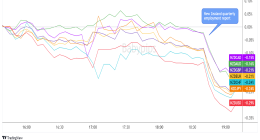
Americans continue to shy away from adding onto their credit cards even as they borrow more to buy houses and cars, according to a new report from the Federal Reserve Bank of New York.
Household debt overall rose by $87 billion, or 0.6%, to $14.35 trillion in the third quarter compared with the second quarter, the New York Fed said. But credit-card balances declined by $10 billion to $810 billion. That followed a $76 billion decline in the second quarter, the steepest drop in data going back to 1999.
That…
This post first appeared on wsj.com









